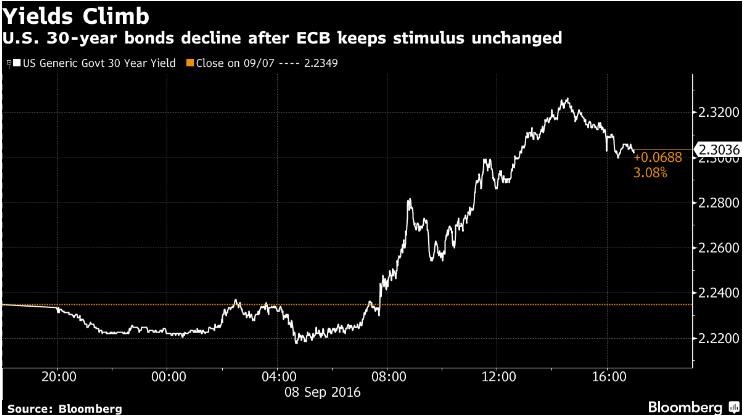The times they are a changin’

Mason Stevens
Mr Draghi's non-committal message is deliberate. There appears to be a coordinated tone creeping into central bank communications acknowledging the limitations of monetary policy (including quantitative easing) and the need for other arms of government such as fiscal policy to play a bigger role in supporting growth. Similar comments had been made earlier by the Bank of England's Governor, Mark Carney.
Mr. Draghi expressed satisfaction that the current stimulus-boosted recovery is "firmer, more robust than other recoveries we've seen in the past." Not everyone in Europe would share his optimism.
If there isn't going to be an extension of the ECB's bond-buying program (not expressly ruled out), the market reasoned that there will be less downward pressure on bond yields in Europe, and that spilled over to the US as well where the Fed has been signaling its intention to raise interest rates again, particularly since Janet Yellen's Jackson Hole speech. The ECB's stance was seen as reducing overseas demand for longer-dated US debt.
The selling pressure was especially felt at the longer end of the yield curve. After the ECB's announcement, the yield on 30-year German bunds rose 9 b.p. to 0.51% and the yield on the 30-year US Treasuries rose 7 b.p. to 2.30%, the biggest increase in five weeks (see chart). The US yield curve steepened as a result, and the negative sentiment spilled over into equity markets.
The strong bond market reaction has left investors wondering whether a significant turning point has been reached, particularly if the Fed pulls the trigger on interest rates. Some weaker-than-expected US data recently, particularly the two ISM indices for US manufacturing and services, have lowered the market's conviction that the Fed will tighten at its next FOMC meeting on 20-21 September, to only about 28%. The market's probability of a Fed rate hike before year-end is only about 58%.
In other words, the market is not well primed for a near-term interest rate rise in the US. The Fed's words are largely being ignored at the short end of the curve. The market remembers that the Fed has "cried wolf" in the past and thinks that it will do so again. However, the Fed is in danger of painting itself into a corner given the strength of its own rhetoric. It may act sooner than the market expects just to maintain its creditability. That would be negative for both bond and equity markets in the immediate aftermath.
DoubleLine Capital CIO, Jeff Gundlach, who called the low in US bond yields back in July, said after the ECB decision that it is time for fixed income investors to prepare for rising interest rates and higher inflation by reducing the duration of their positions, moving money into cash and protecting against volatility.
"This is a big, big moment," Mr. Gundlach said during a webcast on Thursday. "Interest rates have bottomed. They may not rise in the near term as I've talked about for years. But I think it's the beginning of something, and you're supposed to be defensive."
He cited the 8th July closing low US 10-year Treasury yield of 1.358% as evidence that interest rates have hit bottom. He said US 10-year Treasury yields might rise from current levels of around 1.60% to over 2% by the end of 2016.
Mr. Gundlach also stuck to his prediction that Republican Donald Trump will be elected the next US President in November. He said both Mr. Trump and Democrat Hillary Clinton had advocated more spending on infrastructure, which would add fiscal stimulus to the economy as central banks' low- and negative-interest-rate policies across developed markets show diminishing returns. A Donald Trump victory is another significant event risk that is not currently priced into markets.
"This idea that fiscal stimulus may be coming seems to be getting sniffed out by the bond market," Mr. Gundlach said. "More debt spending may increase the cost of government borrowing by adding supply and making investors demand higher yields. People say, 'How can rates rise?' That's how they can rise, and they're sort of rising already."
If Mr. Gundlach is right, the times, they are a changin'.
Contributed by Mason Stevens: (VIEW LINK)
5 topics

Responsible for identifying domestic and international equity investment opportunities. 25 years of financial markets experience as an equity strategist, economist, analyst, portfolio manager and consultant.
Expertise

Responsible for identifying domestic and international equity investment opportunities. 25 years of financial markets experience as an equity strategist, economist, analyst, portfolio manager and consultant.

